© 2023 Dr Margaret Sheppard
Kanana held this service immediately before the special Christmas part of the service on Christmas Eve 1978. After the entrance of the Bishop, at about 11.00 a.m. the purpose of the service was announced by one of the Baruti, that is that it was a special Christmas Service but, before handing the service to the women who would be in charge of that part, some people would be given their new uniforms and a certain Moruti, called Tiro, would be in charge of this part of the service. All were very glad to see Tiro there as he rarely attended as he had been busy at the Lands. Another Moruti would help him. Those people to take their new uniforms would be called in turn and everything would be done as it was written in the Bible.
Tiro replied that he was not very happy about being in this position but he would do it because he had been told to. He had been to the Lands where there was no water at all and he had had a terrible time trying to water cattle daily. Therefore he had been unable to come to the church. A Moruti tried to start a hymn but Tiro told him to stop. This angered the Moruti, who said that they were not supposed to be talked to like that and that everyone had had trouble with rain, not just Tiro (N.B. 1978-
The other Moruti who was in charge then spoke, saying he had a headache and was coughing. He wanted to ask them to pray for him. He reminded the congregation that they should stand up properly as it was still early but they should remember that he himself was not feeling well. Then followed two hymns "The soldiers of Christ are close to him, their eyes are like weapons" and "Miracles can be performed because of this love".
The new uniforms were placed in the centre of the room and the Secretaries were called to record the names of the people taking new uniforms in the church register. One Secretary was called to read the relevant part of the Bible for this service; Zechariah 3, v. 3-
Next, during a hymn, they were prayed on by Tiro. However when this happened many "got the Spirit" uncontrollably -
Another Moruti preached next. He said that some people were not known by God. Some people prepared for God but then forgot what they were supposed to do -
on the Day of Judgement. He complained that the service was supposed to start at 8.00 p.m. but it had not started until 11.00 p.m. Another girl was even pointed to and accused of being late and therefore she was not fit to take a new uniform as she was not truly repentant. Two other women were referred to here, they were two women who had got the Spirit strongly when they were prayed on. This had been partly caused because they were not truly repentant and had arrived at the service too late to confess their sins.
There was another hymn and then the Moruti emphasized that they should continue quickly with the service as they had a lot of work that night. He referred to the Bible readings emphasizing how Joshua had been clothed in clean clothes and left his dirty ones. The Lord had said to Joshua that on that day he was going to put on new clothes, including hats and cloaks. In the book of Revelations it said that wearing white clothes made a person nearer to God because it showed that they had committed themselves to God. He said that he himself had no power greater than the Law of God and if he said he had it would be a great sin. The clothes they wore at the church showed that they would be soldiers of the laws of the country and the law of the Chiefs. The uniforms showed they belonged to their church, and even if people insulted them for being Zionists they had the right to object to this and stand up for their church. He said "children of God, you realise that your clothes are bound with taboos". He added that he was very pleased to have the opportunity to talk and he wanted his name to be registered so that on the Day of Judgement his name would be among those to be saved. Those with new uniforms were asked to come closer and the hymn "The Word is speaking and the Word is for Jesus Christ" was sung. Those who had taken new uniforms were instructed on the laws of their uniforms (there were special uniforms for those women with positions e.g. wives of Baruti) They were to wear them at the special Christmas service and the other special services and during funerals and Botsetsi services of Zionists. As soon as Christmas was over they were supposed to wash their uniforms and put them in a special place. He was very sorry that names had not been listed before the service, but they had been at the Lands and were not prepared. He was very glad that they had been corrected, but they should be forgiven because they had only just arrived from the Lands.
The Bishop then asked to speak. He emphasized that this new uniform was not just ordinary clothes, but should be greatly respected. He referred to how it said in the Bible about the woman who was given a uniform by the Lord and this woman had asked herself a question. At that moment she had been marrying a man whom she was not going to divorce. Their uniforms were like that, by taking them they showed they were members of the church and were not going to lose their uniforms for example, by breaking the laws of the Church. The Word said that the woman took a long time holding the clothes she was given by her Lord and asking herself questions. She said she was not going to divorce him unless she disgraced herself. Some people unfortunately were just attracted to these uniforms without thinking carefully. It was not just a simple thing. Members should wear their uniforms properly and respect them and the Dikhosa (Door keepers) should make sure they enforced the laws of the uniforms properly. People should not take their uniforms for granted as if it just involved buying the material simply at a shop. The clothes were a Communion with God and if one takes them off one was showing that one was breaking this link with God. When one is wearing these uniforms, one should show that one is repentant, if they are taken away from one, one will lose one’s link to God. The members were soldiers and they were responsible for "fighting" for God. He again emphasized that they should wear these uniforms during the following times:-
There was another hymn followed by confusion as one person's new uniform was not there. Then followed another hymn, after which the Bishop reprimanded people for behaving badly at the church. It was not a place to play and he was also angry because a woman who had had Spirit uncontrollably was not being taken care of -
Another Moruti in charge of the service thanked the Bishop for his words but said that they had not refused to allow the girl (having Spirit) to wear their uniform, it was just that she had arrived very late and had insisted on wearing it immediately. She had taken the uniform before she was properly prepared for it. It was then revealed by one of the women that that girl was menstruating and so she should not have taken her new uniform -
He started a hymn "We are going back to Canaan". A Moruti announced that if people thought they were going to start having Spirit that they could not control, they should not dance. A hymn followed, "Lord visit them".
Next everyone was told to return to their proper positions (those who had received new uniforms were still in the centre of the dance circle). Tiro complained that the reader of the Bible, an Evangelist, kept quarrelling with him because he had not been coming regularly to the church, this was a very disappointing action during the Birth of Christ. He had told people at the beginning about the problem with his uniform jacket being washed in Javel. (These discussions and arguments are interesting as they could perhaps be compared with Kgotla meetings and trials where anyone who wants to speak and voice their opinions, is given a chance to do so.)
New Uniforms and Church Promotion Service
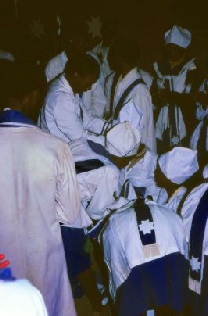


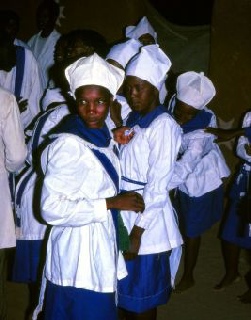
Then the other Moruti in charge of the service said they had now finished the Uniform service and would hand over to the women who were in charge of the special Christmas service. However at this point one of the Baruti asked to be prophesied. The Moruti in charge put him in the middle of the dance circle and told members they should dance one behind the other and copy the ones in front or they would trip over each other. Another Moruti complained that people danced too slowly and if anyone did this they would be told to rest as it was not fair to the other dancers. The woman with Spirit was still having Spirit during this time. The hymn "Halleujah" was sung, after which a prophet started by saying that when he asked his Spirit, about this man, he could “see” the man in agony and a house that was not yet finished. People were still working on this house, and it was being built of bought cement blocks. He also said that he could "see" people coming to weep in that house and he could “see" that man weeping with them. The house had the window and door frames, but was not finished, he could “see” that this new house was on the outside of the yard and there was space between it and the others in the yard; he was not quite sure of the place, but the man being prophesied should say whether or not it was there. (This is like the approach of traditional doctors; patients must agree with the first part of the divination before the ngaka ya Setswana moves on to more.)
He continued that in his Spirit he "saw" a cow that man would quarrel over, but later he would regret this and cry bitterly over it. Maybe he was going to send money to buy a cow and that money would not be properly used in the way in which he had intended. The man replied at this point that the only thing he had bought was a goat.
The prophet continued that he saw the leg of that man with pains in the ankles and when he was working he sometimes got tired and hated to do his work properly. He (the prophet) could also see a person with spectacles. The man agreed that there was a person with spectacles. The prophet continued that his mind was confused over girls and not settled on one girl. He had bought things with his money and these things made him worried. He had a lot of things but these would disappear. His Spirit told him they should pray for this man because in his Spirit he "saw” that he would have an accident (car) and it would leave him in the dust. That was all he had “seen”~ but he emphasized that that man's heart beat quickly and he should look after himself because he could “see” that he "worked for girls" who would steal his money and he would remain in poverty in the end. This was not his fault, it was because he had many enemies and they were bewitching him so that he could not succeed. He should be very careful or he would go mad. Even now he was very confused and had lost his power. When he was at the mines he always thought about a certain girl whom he really loved and decided he should marry her. But when he returned he just forgot about her and went around with a lot of girls. The man agreed to this and added that sometimes when he talked to people he felt shocked and afraid.


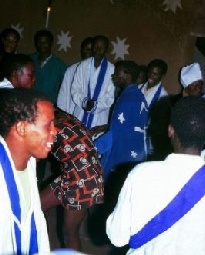



New uniforms placed in the middle of the dance circle and then danced around whilst Moruti in charge prayed upon them
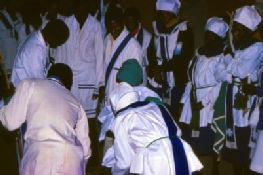
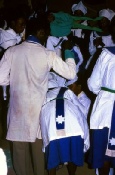





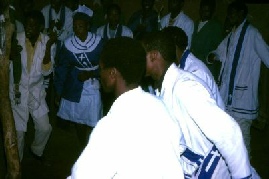


Moruti who asked for prophesy stands in the middle of the dance circle whilst members dance around him




Dancing around him and singing hymns to “call” the Holy Spirit to enable the prophets with the gift of prophecy reveal prophecy
Prophets reveal to the man what the Spirit has “shown” them.
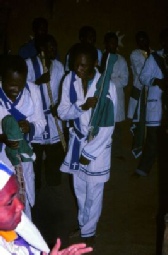
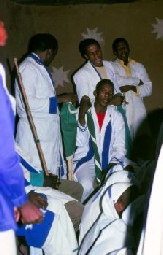


Then followed a hymn "All over the world, talk well of Christ's name" and as no one else wanted a prophesy the special Christmas service started.
Women dressed women in their new uniforms and men dressed men. They were prayed upon by the Moruti in charge but some “got the spirit” and fell about as his new wife (a non Zionist) had washed his uniform in bleach.
Tiro, one of the Baruti leading the service revealed his uniform had mistakenly been washed in bleach by his pregnant new wife (a non-
New uniforms, which often imply promotions may be given out at individual church services or, if the church has several branches, at the annual church conference, so that the promotion will have a wider recognition. All the churches held church conferences once or twice a year, Easter and Independence being the favoured times as that is when there are long holidays.
I attended two services at which new uniforms were presented. One at Kanana which formed a part of the special Christmas service and which was attended by members usually absent in South Africa, the other at B.U.C.Z. formed part of the annual church conference. In both the format was similar. The uniforms were placed in the centre of the dance circle, and the congregation danced around them singing hymns. Those to receive new uniforms or promotions entered the dance circle and were danced around. Then they were dressed in their new uniforms, women dressing women and men dressing men. Each individual was prayed upon.
At both services the names of each newly promoted person was entered in a book by the appropriate Secretary. At the Kanana service one of the Baruti leading the service revealed his uniform had mistakenly been washed in bleach, a taboo, by non-
The Biblical justification for this service is taken from the story of Joshua where Joshua's filthy clothes were replaced (Zechariah 3, v 3-

Kanana (God is Love) new uniforms